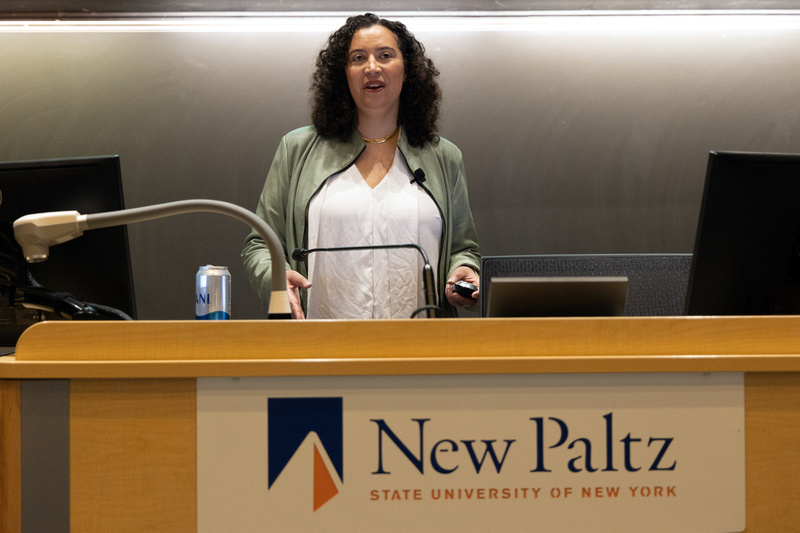How AI is impacting us, and what to do: Acclaimed journalist delves into timely topic
The College of Liberal Arts & Sciences hosted New York University professor and data journalist Meredith Broussard for an engaging conversation on April 11, moderated by Creative Writing Program director Kristopher Jansma, on the impact of artificial intelligence as part of its Without Limits: Interdisciplinary Conversations in the Liberal Arts series.
As an expert in this topic, Broussard has written numerous articles detailing how ChatGPT, facial recognition software and other AI-operated devices can both harm and help society.
“We need to be honest about the limits of what we can do with machines,” she said. “We expect AI to be this special thing, but it’s flawed like anything else.”
These tools are built with an algorithm that auto-generates words and images based on what the user is looking for. However, while the algorithm appears to be doing all the work for the user, there are human beings who created it, meaning that the algorithm can produce results stymied by their own unconscious biases.
“These systems are socio-technical, so they operate based on the social climate of a period of time,” she said, “but we have agency in mitigating the worst effects of this. We need to change society at the same time as technology.”
One major solution is to have more diversity in the rooms where these products are made.
“We need to have less homogenized groups of people in these spaces and empower them to speak out when they see something going wrong,” she said.
A concern with AI in academia is that students will grow increasingly reliant on programs like ChatGPT to generate essays in a flash. While platforms like this are convenient to use, they can produce mundane content below the collegiate level.
“Generative AI programs are predicting the next word in a sequence, so we as users can start to make predictions on what’s going to come out of them,” she said. “This ultimately inhibits the quality of the work.”
Still, AI can be used productively if it helps a student, or anyone else, get started on a project.
“Automated transcription software helps synthesize notes that can be useful for an assignment,” she said. “If you use AI to start something, and then you make it better, then that’s a legitimate use.”
Broussard has published two books, “More Than a Glitch: Confronting Race, Gender, and Ability Bias in Tech” and “Artificial Unintelligence: How Computers Misunderstand the World,” in addition to her articles on the implications of artificial intelligence technology. Read more here about Broussard’s work.
The author and NYU professor’s talk was only one of the discourses SUNY New Paltz has featured about the advent of AI. For a list of resources, webinars and more on this topic, click here.
Click here to learn more about the College of Liberal Arts & Sciences Without Limits series.

